timesofisrael – Foreign Minister Yair Lapid indicated on Monday that the Biden administration may be open to delisting the Iranian Revolutionary Guards Corps as a terrorist organization, and called on international actors to convince the White House to reject this Iranian demand.
“Everyone in his right mind should talk to the administration about this and tell them, ‘This is just wrong, don’t do that,’” said Israel’s top diplomat, speaking in Jerusalem at the Conference of Presidents of Major American Jewish Organizations.
In front of the same forum the night before, Prime Minister Naftali Bennett also warned that Tehran was demanding the IRGC be delisted.
“They are now asking to let the biggest terror organization on earth off the hook,” Bennett said.
In July, Iran’s Foreign Ministry said in a report to parliament that the US would delist the IRGC and remove sanctions on senior Iranian officials if a nuclear deal were reached in Vienna.Get The Times of Israel’s Daily Editionby email and never miss our top storiesNewsletter email addressGET ITBy signing up, you agree to the terms
In 2019, Trump administration secretary of state Mike Pompeo announced that the IRGC would be designated a foreign terrorist organization, the first time the US blacklisted an entire entity of a foreign government in this way.
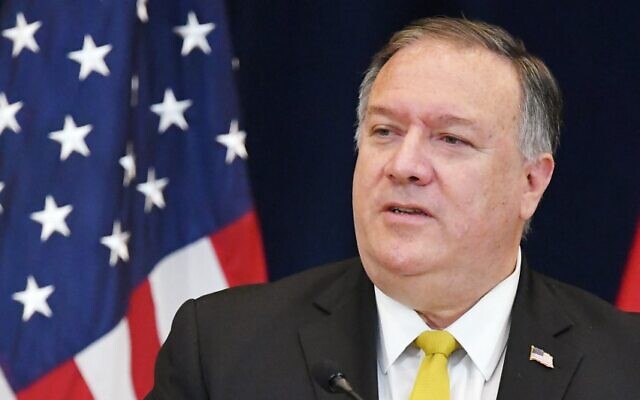
Illustrative: US Secretary of State Michael Pompeo speaks during a press conference at the State Department in Washington, on August 19, 2020. (Mandel Ngan/AFP)
The designation came with sanctions, including freezes on any assets the Guard had in US jurisdictions and a ban on Americans doing business with it or providing material support for its activities.
Lapid said Monday that any potential return to the 2015 JCPOA “is a return to a weaker agreement just because of the time.”
“We were unhappy with the deal to begin with,” he said. “We are more unhappy with a deal that has lost four years.”
The so-called sunset clauses of the deal limit Iran’s use of certain advanced centrifuges until 2025 and cap its uranium stockpile until 2030.
Iran has breached both aspects of the deal since the US pulled out of the accord in 2018.
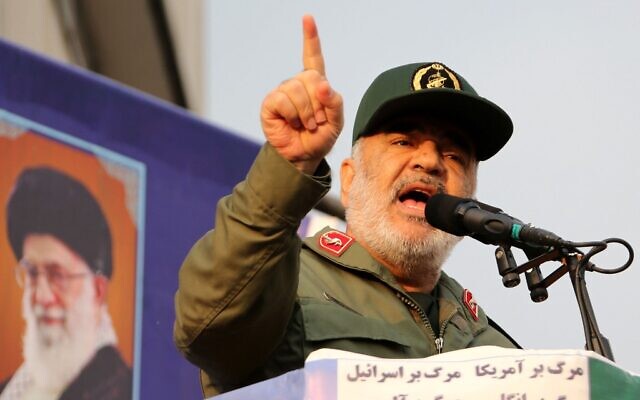
Iran’s Islamic Revolutionary Guards commander Major General Hossein Salami speaks during a pro-government rally in the capital Tehran’s central Enghelab Square on November 25, 2019. (Atta Kenare/AFP)
Despite Israel’s disagreement with the Biden administration on the advisability of a return to the Iran nuclear deal, Lapid said the two allies “disagree in a manner that helps us work with them a) on the results of the disagreement, and b) on other issues.”
He listed the Abraham Accords, the economy, and Syria as issues they were cooperating closely on.
Lapid contrasted the tack his government has taken toward the White House with former premier Benjamin Netanyahu’s attitude of “provocative conflict” with the Obama administration.
“It just spoiled the relations Israel had with the administration, and with nothing to [show for it],” he said. “They did the JCPOA, and ignored the fact that Israel was so much against it.”
Lapid said Netanyahu had almost cost Israel its vital bipartisan support in Washington: “This is not to be played with and it was played with.”
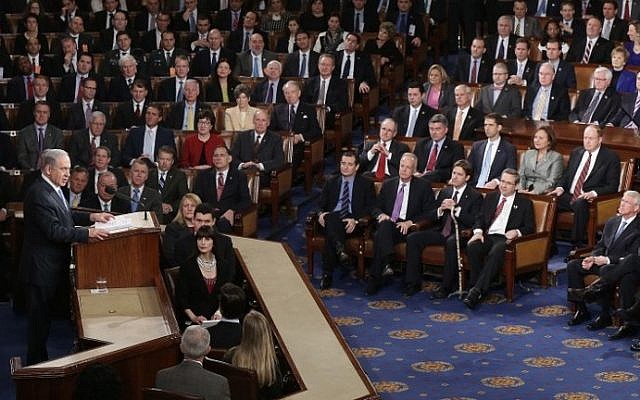
Prime Minister Benjamin Netanyahu speaks about Iran during a joint meeting of the United States Congress in the House chamber at the US Capitol on March 3, 2015 in Washington, DC. (Win McNamee/Getty Images/AFP)
“We did a good job of restoring the bipartisan stature of Israel in Washington,” Lapid said.
“The easy thing to do is to go on television and yell and shout about the administration,” he continued. “But this is irresponsible. I am a responsible person and this is a responsible government.”
Lapi allowed that Israel acting to protect its interests could have a “price tag attached to it” in terms of its relations with the US.
In the meantime, he said, Israel is in close contact with the US on other ways of stopping Iran from becoming a nuclear threshold state, and what “longer and stronger” means in the context of a nuclear deal.
Israel as a ‘Baltic’ nation
Turning to tensions on the Russia-Ukraine border, Lapid said that conflict “is still avoidable.”
He was optimistic about French President Emmanuel Macron’s diplomatic efforts over the weekend, expressing hope that they would lead to a meeting between the Russian and American foreign ministers on Thursday and between Biden and Russian President Vladimir Putin next week.
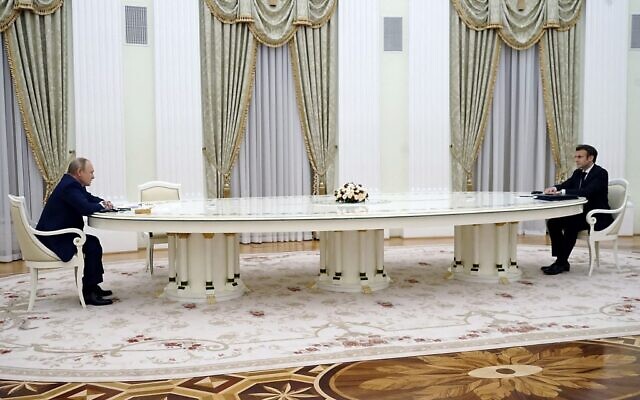
French President Emmanuel Macron (R) meets with Russian President Vladimir Putin (L) in Moscow on February 7, 2022 (SPUTNIK / AFP)
Lapid was open about the delicate balancing act Israel must perform between its US and Western allies on the one hand and Russia, with which it has a close relationship, especially over Syria, on the other.
He said that Israel was in some ways like a Baltic country because of the presence of Russian forces in Syria. “We have a ‘border’ with Russia, so we have to take this into account.”
Israeli diplomats also have to be particularly careful because of the large Jewish communities in both Russia and Ukraine. “I have to be more careful about this issue than any other foreign minister in the world,” said Lapid.
“The Israeli government is not only the government to Israelis, it is also the leading force of the Jewish people,” he said.
Because of the “special relationship” Jerusalem has with Washington, the US would understand if Israel did not take part in potential strict Western sanctions in Russia, he said.
“They understand this, because they understand us,” Lapid said.
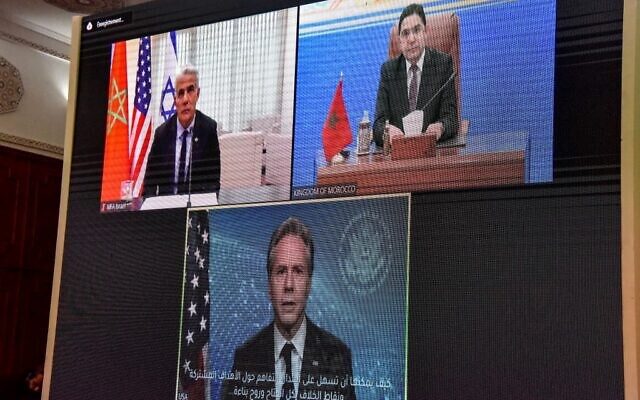
A picture taken in the office of Morocco’s Foreign Minister Nasser Bourita’s (top-R) in the capital Rabat, shows him and his counterparts Israel’s Yair Lapid (top-L) and Antony Blinken of the US (Bottom), take part in a virtual meeting, on December 22, 2021. (AFP)
On the Abraham Accords, Lapid said that the Biden administration supported Israel’s burgeoning relationships with the UAE, Bahrain, and Morocco, but didn’t show enthusiasm for it when the president first came into office.
“They were hesitating, they weren’t sure how to approach this,” he said.
Now, Lapid said, the administration was “embracing” the Abraham Accords, even if no new Muslim countries seem close to joining.
“We knew when we came into office that it’s going to be very hard, it’s going to take some time before we can add some countries,” Lapid said. “Right now the most important thing to do and the most important tool in order to have more countries in the Abraham Accords is to make the Abraham Accords into a success story.”
 Shabtabnews In this dark night, I have lost my way – Arise from a corner, oh you the star of guidance.
Shabtabnews In this dark night, I have lost my way – Arise from a corner, oh you the star of guidance.



